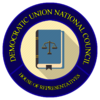Constitution of the Democratic Union of British States
 | |
| Long title | Constitution of the Democratic Union of British States |
|---|---|
| Nicknames | Constitution, the Constitution |
| Enacted by | Constitutional convention |
| Effective | December 23rd, 2016 |
| Introduced by | Horatio Eden of the District of Britannia |
| Current status | Active legislation |
| Citations | |
| MSLC citation | Constitution of the Democratic Union of British States DUN P 2016 |
| Codification | |
| Amended by | Early Elections Act, 2nd January, 2016 |
| Legislative history | |
| Considered by | Constitutional Convention |
| Signed by Lord President | Signed by Lord President Horatio Eden on the 23rd of December, 2016 |
| Creates the Democratic Union of British States | |
| Democratic Union of British States |
 This article is part of the series: |
|
|
| Constitution |
|---|
| Federal Government |
|
Executive
Lord President Lord Vice President Federal Cabinet Legislative
Chamber of Designees Meritocratic Chamber Judiciary
National Constitutional Court Political parties
Conservative and Democratic Party • Socialist-Green Party • DUBS Independence Party |
The Constitution of the Democratic Union of British States is the supreme law of the Democratic Union of British States. Written by incumbent Lord President of the Union, Horatio Eden, on the 23rd of December, 2016, comprises six separate articles and sets out the form of the Union's government. The first three articles of the Constitution delineate the executive, legislative and judicial power of the government into three separate branches in accordance with the doctrine of separation of powers, granting them to the position of Lord President, National Council and National Constitutional Court, respectively. Article Four sets out the relation between state and federal government, granting in theory a large amount of devolution to the state governments (of which there is presently one for the District of Britannia, the current sole state of the Union), as well as making it illegal for states to raise tariffs with each other and requiring the states to possess a system of extradition with each other.
The Constitution has yet to be amended. Amendments to the Constitution, per Article Five, require either the "support of two-thirds of the House of Representatives and the approval of the Lord President" or "the ratification of an amendment by two-thirds of the state legislatures".[1]
Historical context
The King of the Free City-State of Edenopolis, Horatio Eden, had visited a former territory of the Federal Republic of Whestcorea, a country where he had formerly served as Federal Mememaster-General, or head of state, and originally intended for the territory to become an overseas territory of Edenopolis. However, instead, he framed the Constitution during a Constitutional convention of one person - himself - and signed it into law on the same day, the 23rd of December, 2016.
Original frame
Article One
Article One sets out the form of the legislative branch of the government. The Constitution vests the legislative authority of government in a National Council, made up of a single chamber, the House of Representatives, which is re-elected every six months by the population of the various states.[2] It also sets out the rules under which citizens can become members of the legislature, they must be "17 years [old], be a citizen or national of the Union, and be a legal resident of the state they wish to represent."[3]
The National Council is allotted the following powers under the Constitution:
- Raise taxes on citizens and companies;
- "Provide for the common defense of the Union";[4]
- Regulate the military of the Union;
- Set out how people may become citizens, through a uniform policy of naturalisation;
- Formulate relations with other international powers;
- "Make and enforce all laws which shall be required for the expedient government of the Union".[5]
The "make and enforce" clause is the vaguest clause of the six, leaving a lot of the federal government's authority up to interpretation. It is expounded upon later, however, that the National Council can regulate on behalf of the states until such a time as the population of the Union "exceeds twenty persons".[6]
